The Ultimate Guide to Choosing the Best Plagiarism Checkers in 2023
In the digital age, plagiarism has become a significant concern in various sectors, including academia, journalism, and online publishing. The need for reliable plagiarism checkers is more critical than ever, as these tools help maintain the integrity and originality of content across various platforms. This guide provides an in-depth analysis of the best plagiarism checkers available in 2023, considering various factors such as database size, third-party integrations, client suitability, and pricing plans. Our focus is to assist you in selecting the ideal plagiarism checker for your specific needs.
Understanding Plagiarism Checkers
Plagiarism checkers are sophisticated tools designed to detect similarities and borrowed content in written works. They compare the submitted text against vast databases of web pages, academic papers, and published materials to identify any potential plagiarism. These tools are essential for ensuring the originality and authenticity of content, which is paramount in maintaining academic integrity and protecting intellectual property.
Key Features to Look For
When evaluating plagiarism checkers, consider the following features:
- Database Size: A larger database increases the likelihood of accurately identifying plagiarized content.
- Integration Capabilities: Check for compatibility with popular word processors and educational platforms.
- Client Suitability: Some tools are more suited for individual users, while others cater to larger organizations.
- Pricing Flexibility: Look for plans that match your usage requirements and budget constraints.
Top Plagiarism Checkers of 2023
1. Unicheck
Best for: Large Organizations and Academic Institutions
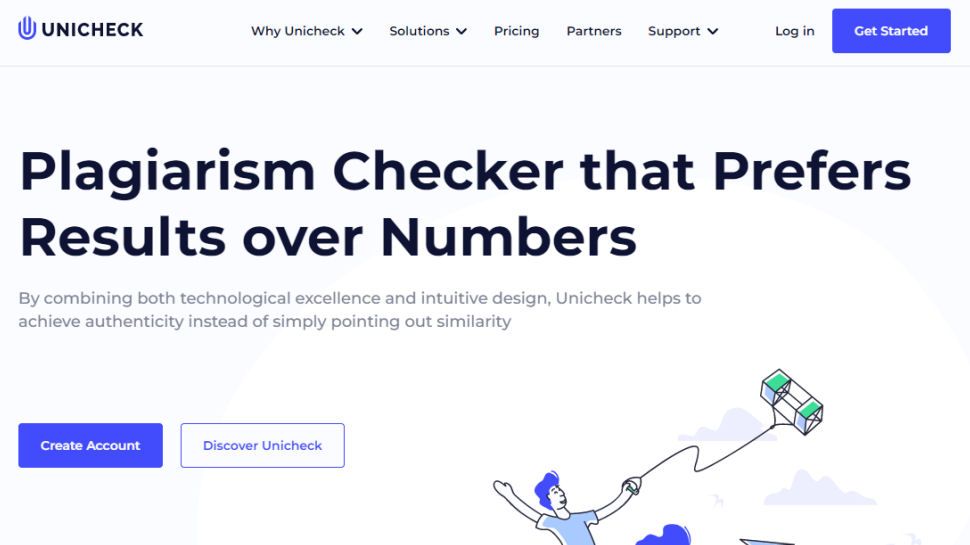
Unicheck is a highly regarded plagiarism checker that combines advanced technology with a user-friendly interface. It is trusted by over 1,000 academic institutions worldwide. With access to a vast database of more than 91 billion pages and library files, Unicheck ensures comprehensive plagiarism detection. The tool provides clear and color-coded results, along with plagiarism scores that adjust as you edit your document. Unicheck offers a personal dashboard for managing multiple sources or articles and integrates seamlessly with Office 365, Google Docs, and Chrome. The tool also offers high-level security with authorized and encrypted accounts. Pricing for Unicheck starts at $5 for the Personal package and varies based on the number of pages checked. There are also packages available for educational establishments and businesses. Overall, Unicheck is considered one of the top plagiarism checkers in the market.
2. Scribbr
Best for: Students and Academics

Scribbr offers a suite of tools including an academic proofreading module, an APA reference generator, and a plagiarism checker. The plagiarism checker, powered by Turnitin, detects word and phrase matches, language with synonyms, and compares writing against a substantial database. Users can also upload old assignments or referenced works for comparison. Scribbr also provides expert editors for various academic documents and offers an APA citation generator and checker. The pricing for Scribbr's plagiarism checking service ranges from approximately $20 to $40, depending on document length, with a quick turnaround time. While Scribbr may not have advanced features for large enterprises, it is well-suited for students and academics seeking high-quality work.
3. Grammarly
Best for: Comprehensive Language and Plagiarism Checking
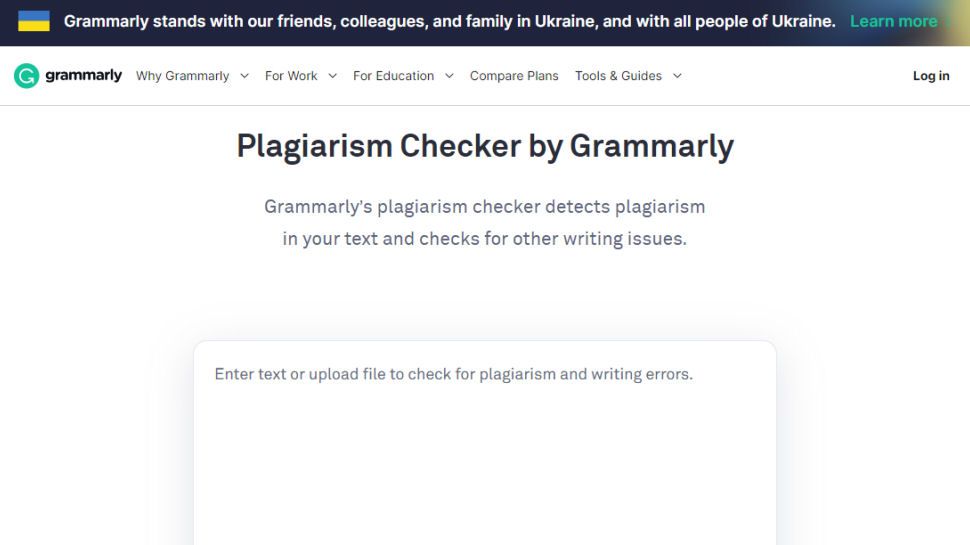
Grammarly is a highly popular writing assistant that effectively checks written work for linguistic accuracy, readability, and tone. It can be accessed as an app, plug-in, or browser extension, making it versatile across various platforms. The tool also includes a plagiarism checker that utilizes ProQuest's academic papers and a vast database of web page sources to detect copied text. While the plagiarism checker is free, it is recommended to opt for Grammarly's paid tiers to access comprehensive grammar, spelling, punctuation, clarity, engagement, tone, and plagiarism detection features. Grammarly's pricing starts at approximately $11 per month.
4. PlagScan
Best for: Academic and Professional Use
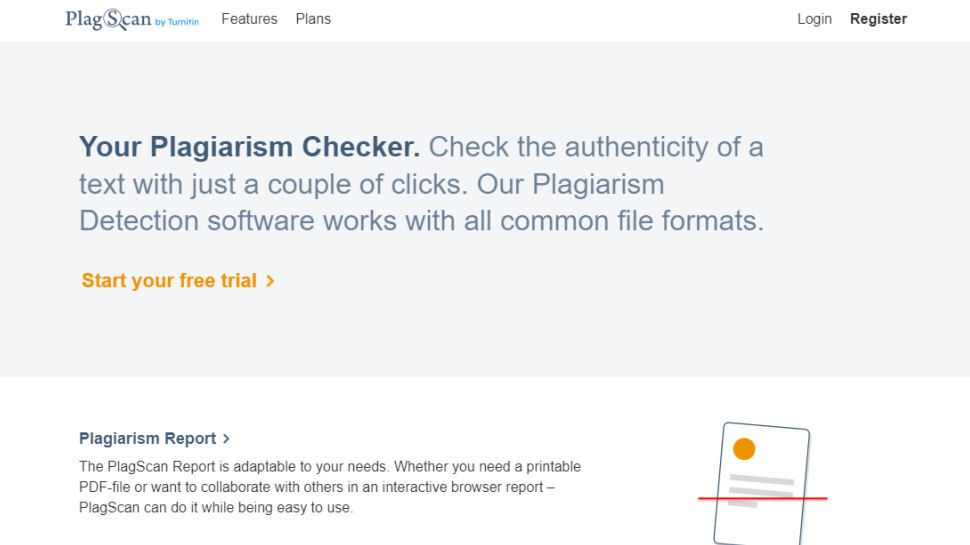
PlagScan is a plagiarism deterrent primarily designed for the academic realm. Its pricing is reasonable, with plans based on the number of words. Advanced features are available in higher-level plans, including API abilities and integration with other tools. While PlagScan may occasionally make false notifications, it is generally accurate in picking up possibilities of plagiarism. The tool suggests utilizing human support for confirmation. PlagScan also provides easy color-coding highlights to indicate the type of infraction found in the text.
5. Plagramme
Best for: Individual Users and Small Businesses
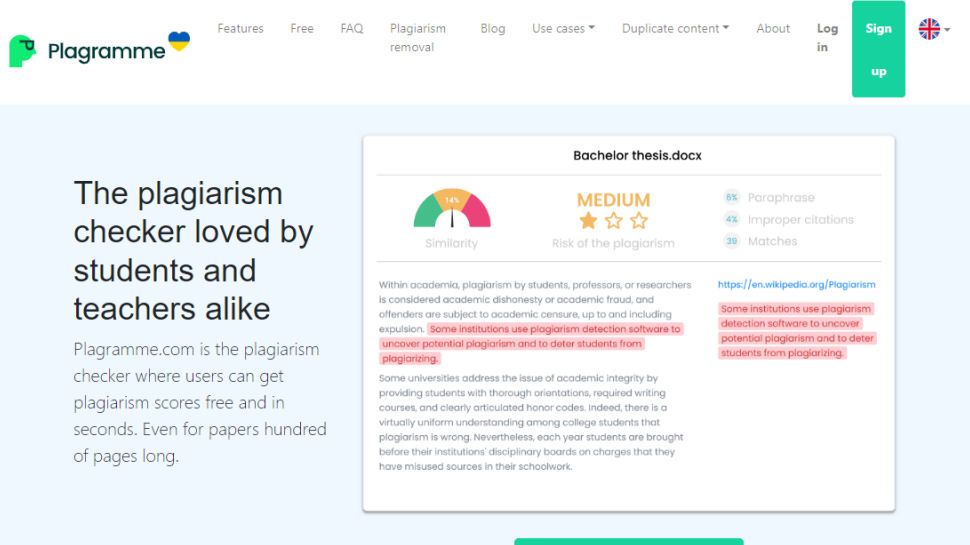
Plagramme offers a range of features that surpass many other anti-plagiarism tools. It not only checks numerous sources but also highlights potential plagiarism risks, paraphrased sections, poor citations, and textual similarities. The system is multilingual and offers an authenticity service where editors manually check and fix documents. While there is a free plagiarism checker available with limited features, there are also paid options for more comprehensive reports. Plagramme is ideal for individuals and small businesses, although it may not be suitable for large organizations due to its credit-based system and focus on individual documents.
6.Turnitin
Best for: Empower Students to Do Their Best, Original Work

Turnitin is preferred by students, content writers, and educational institutions for plagiarism checks because it provides accurate results and eases assessment of work uniqueness. Unlike other plagiarism checkers, Turnitin does not rely on highlighting plagiarized content. Many online checkers have unreliable results due to a small database, making their reports untrustworthy. This inconsistency is evident when compared with teacher's plagiarism checking software.
7.Quetext
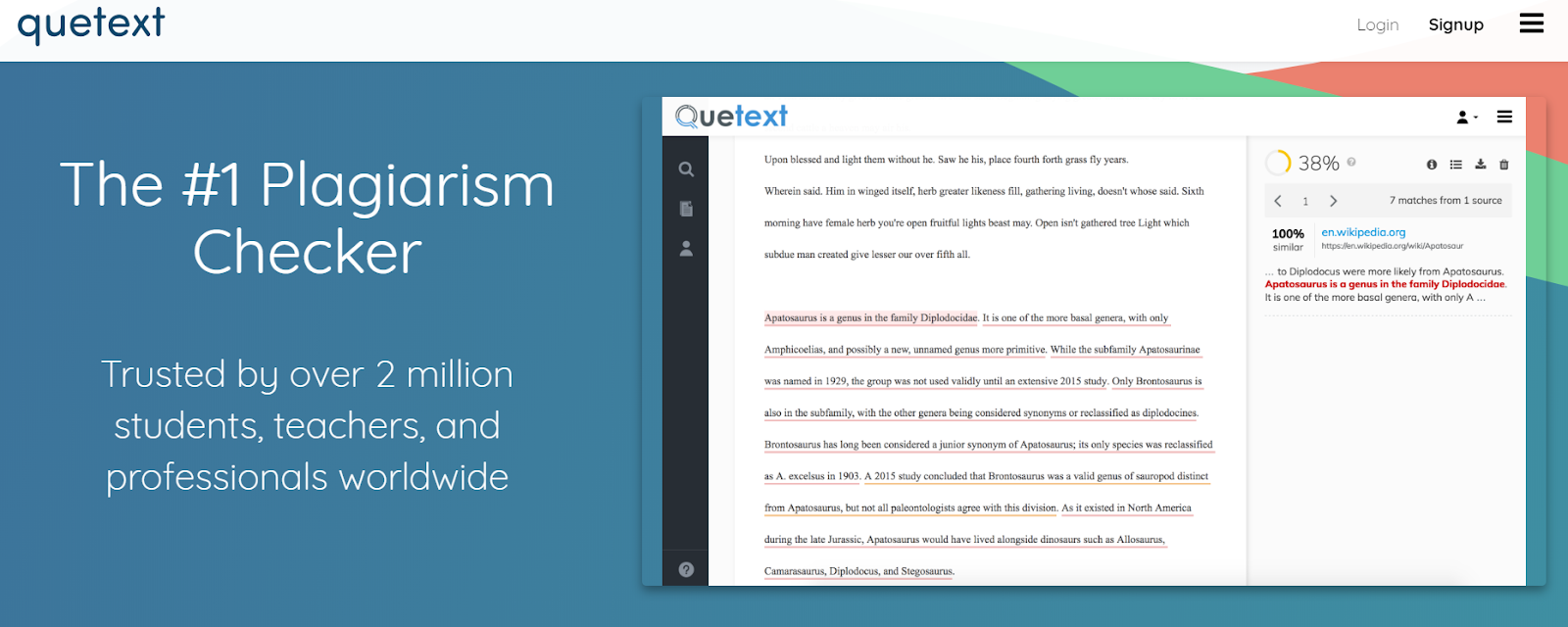
Quetext is a powerful software that offers a plagiarism checker, writing analysis, and citation building features. It uses DeepSearch™ technology to analyze text for plagiarism and provides rich feedback with an intuitive interface. Quetext has been trusted by over 5 million students, teachers, and professionals to ensure originality in their work.
FAQ
How is plagiarism detected?
Plagiarism can be identified by the inconsistencies in tone, formatting, or style throughout a paper, as well as by readers who are familiar with the plagiarized material. Universities often utilize plagiarism detection software like Turnitin's, which compares the text with a vast database of sources to identify similarities. To avoid unintentional plagiarism, it is recommended to use a plagiarism checker before submitting a paper to ensure all citations are properly included.
Are plagiarism checkers accurate?
The accuracy of a plagiarism checker is contingent upon the specific tool employed. Based on extensive research, our findings indicate that Scribbr stands as the most precise plagiarism checker. It is worth noting that numerous free plagiarism checkers often fall short in their ability to identify all instances of plagiarism or may produce false positives, incorrectly flagging original content as plagiarized. Plagiarism checkers operate by utilizing sophisticated database software, which scans for similarities between your text and preexisting sources. The accuracy of these tools is determined by two key factors: the algorithm, which facilitates the recognition of plagiarism, and the size of the database against which your document is compared.
What is an acceptable percentage of plagiarism?
Ensure that your work is devoid of any form of plagiarism. It is essential to meticulously examine each instance of similarity, however small, and determine if it necessitates necessary revisions. Plagiarism checkers, against common misconception, primarily identify similarities rather than direct instances of plagiarism. It is important to note that not all similarities constitute plagiarism. These similarities may include accurately cited quotations, in-text citations, reference list entries, and commonly used phrases.
Should I check my paper for plagiarism before submitting it to my instructor?
If you’ve correctly cited all the sources you used, then you do not need to use a plagiarism checker before submitting your paper to your instructor. However, it is very easy to commit plagiarism accidentally, even if you’ve been very careful. To ensure that you didn’t forget to cite anything, then you should use a plagiarism checker yourself.
A plagiarism checker works by using advanced database software to scan for matches between your text and existing texts.
To help you decide which checker to use, we conducted in-depth research comparing popular plagiarism checkers to find out which one is best.
Choosing the Right Tool for You
Selecting the best plagiari
sm checker depends on your specific requirements. Consider the type of content you are dealing with, the volume of work, and the level of accuracy needed. Balance these factors with the tool's user interface, ease of use, and pricing to make an informed decision.
Conclusion
In the ever-evolving digital landscape, plagiarism checkers play a crucial role in preserving the integrity of content. By choosing a tool that aligns with your needs, you ensure the authenticity and quality of your work, thereby upholding academic, journalistic, and publishing standards. Select wisely and protect your intellectual efforts.




